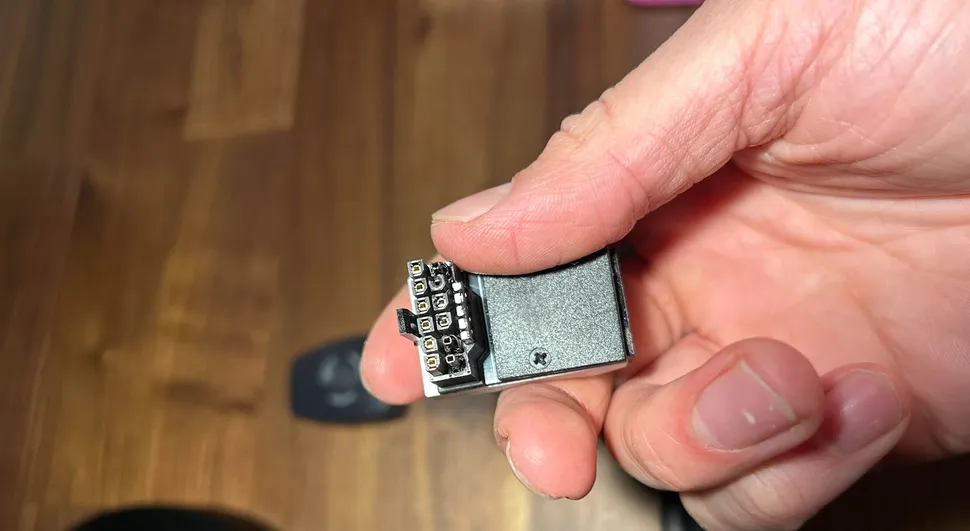
For safety reasons and following reports of damage caused by melting connectors, aftermarket adapter company CableMod has announced that it is recalling the 16-pin 90 and 180 degree adapters (version 1.0 and version 1.1) that it designed to work specifically with NVIDIA's failure-prone power connectors in its GeForce RTX graphics cards. Next generation.
CableMod has announced that it will make an official announcement with more details for users of the above products in a few days. However, it advises users to immediately stop using these adapters, regardless of whether they notice any signs of melting or overheating. The aftermarket computer solutions manufacturer made the announcement Through the subreddit he maintains. She explains in her post that adapters made with 90 or 180 degree 12VHPWR (version 1.0 and version 1.1) are defective as if the connection between the adapter and the socket/connector on the graphics card becomes loose, which can cause overheating which exacerbates the problem. It can lead to melting (melting) of the graphics card socket.
The problem is that NVIDIA and its partners (such as graphics card manufacturers) do not cover damage that may occur from using third-party adapters like CableMod. Before announcing the recall, CableMod had offered to repair graphics cards that had been damaged and had their RMAs denied due to the use of their adapters. CableMod to fix graphics cards affected by the issue Works with NorthridgeFix repair company.
In fact, reports of connectors on NVIDIA graphics cards overheating and melting continue to mount. Repair company NorthridgeFix reported receiving an average of 100 burned-out GeForce RTX 4090 graphics cards on a monthly basis. These graphics cards are of course not just from CableMod, but also from individual users with NorthridgeFix reporting that the issues they are experiencing are not just due to user error, but are mostly caused by adapters or cables, with a poorly designed 12VHPWR Gen 1 connector being the solution. The main reason.
CableMod's new power adapter version 1.1 is PCI SIG CEM 5.1 compatible and has a redesigned app, but obviously issues still exist. When CableMod announced the new Version 1.1 adapters, they made sure to ship them to customers who had purchased Version 1.0 at no additional cost (except shipping). But then came December 2023 to announce that it would recall all of its transformers.
And other problems?
The CableMod public safety recall may apply to adapters rather than cables, but the subreddit above mentions other issues that have been confirmed by numerous complaints.
The specific issue reported by several users is not limited to the CableMod but to cables and adapters from various power supply manufacturers and NVIDIA's AIC (Add-in Card) partners as well as NVIDIA itself. What is this? Apparently the 16-pin 12VHPWR connector is causing a black screen in conjunction with an issue with the fan running at 100% RPM while the system is still active. For this particular issue, CableMod suggests changing the power management mode of your NVIDIA graphics card to “Prefer Maximum Performance” through the control panel in the company's driver suite. CableMod admits that its suggestion isn't guaranteed to solve the problem, but it may help some users. This particular issue also affects not only GeForce RTX 4090 graphics card users, but also users who have other graphics cards with the popular 16-pin 12VHPWR connector. In general, other issues have been observed with aftermarket products related to the 16-pin 12VHPWR connector. Nvidia Continue calmly to switch to a more secure 12V-2×6 connector on some GeForce RTX 4090 cards (like the one found in the RTX 4070) but the company is still tight-lipped on the issue. Logically, the new “SUPER” graphics cards will have the most secure slot, but that remains to be seen in practice.
-
1
-
9

“Avid problem solver. Extreme social media junkie. Beer buff. Coffee guru. Internet geek. Travel ninja.”







More Stories
In Greece Porsche 911 50th Anniversary – How much does it cost?
PS Plus: With a free Harry Potter game, the new season begins on the service
Sony set to unveil PS5 Pro before holiday season – Playstation